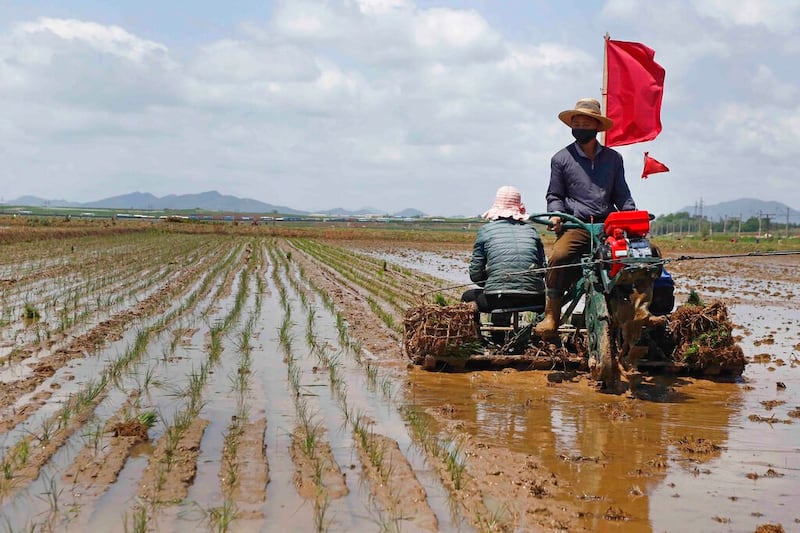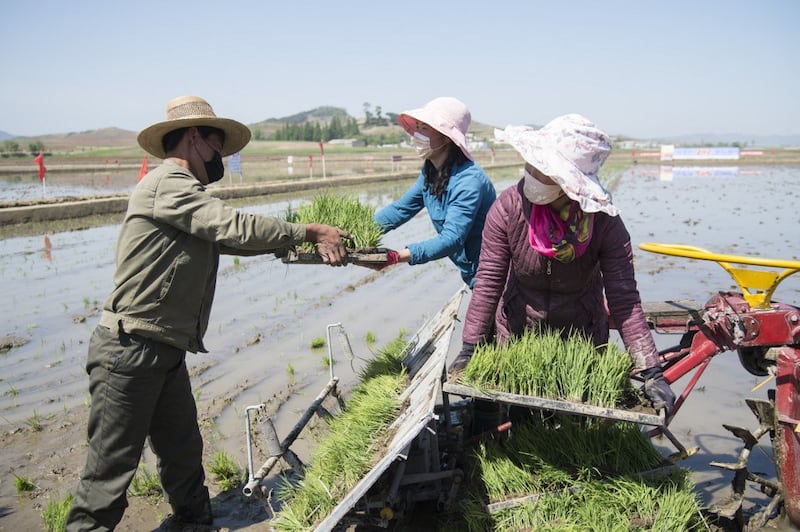A food shortage in North Korea appears to be spreading, with sources inside the country telling Radio Free Asia that as many as 30% of farmers in two northern provinces are unable to work on collective farms because they’re weak from hunger.
Although the army has been sent in to pick up the slack, the food crisis has grown dire in Ryanggang and Chagang provinces, which border China, a resident connected with rural economic planning in Ryanggang told Radio Free Asia’s Korean Service on condition of anonymity for security reasons.
North Korea is chronically short of food each year. But a drought last year that ruined potato and corn harvests, combined with the lack of imports from China due to a prolonged border closure during the COVID-19 pandemic, has made the situation worse, the economic planner said.
Steps the government took to cope with the pandemic may also be contributing to the shortage.
Most farms in North Korea are collective ventures, where workers in a region cooperate to plant and harvest food, which is then shared among the communities.
But last year, the government distributed a plot of land to each family to cultivate so that they would not come in contact with each other and potentially spread the virus. This made worker attendance irrelevant from the authorities’ point of view, as each family worked their own plot.
“The current food crisis in the cooperative farms in Ryanggang and Chagang is so serious that it cannot be compared to 2022, the time of the coronavirus pandemic,” the economic planner said.
Keeping people in line
Authorities are punishing administrative officials who cannot keep the minimum worker attendance rate of 60%, the planner said.
The Organization and Guidance Department of the Central Committee ordered that in the event that any workers at collective farms die of starvation, lower level administrative and party officials will be “severely punished,” another Ryanggang resident said.
A U.N. expert agrees that the crisis so far this year appears worse than the year before.
Currently, around 42% of the North Korean population is malnourished due to food shortages, Elizabeth Salmón, the UN special rapporteur for human rights in North Korea said in a report to the UN Human Rights Council.

North Korea will be short by about 800,000 tons of rice this year, a representative of South Korea’s National Intelligence Service, or NIS, said in a closed business report to the National Assembly Intelligence Committee in March.
Potatoes cost 2,000 won, or about 20 US cents, per kilogram (2.2 pounds) in the marketplace in Hyesan, Ryanggang province, the economic planner said. That’s the highest price since 2015, he said.
“It’s evidence that the food shortage of the residents in the northern mountainous area is serious,” she said.
Fleeing hardship
Living conditions are so bad that two desperate families this month fled the country on a fishing boat, crossing over into South Korean waters in the Yellow Sea, according to interviews conducted by the military and the NIS.
Fleeing North Korea on the high seas is relatively rare, as most escapees leave the country by crossing the border with China. The last such escape occurred in 2017, when five North Koreans fled to the South in waters east of the peninsula.
The South Korean military first spotted the fishing boat as it approached the disputed Northern Limit Line maritime border. When the boat crossed the line, the military boarded and confirmed the escapees’ intentions to flee to the South.
They were then transferred to an investigation facility for interrogation and background checks. Once cleared, they will be admitted to a settlement support center for North Korean refugees, for about three months before joining South Korean society.
Two South Korean government agencies confirmed the incident to RFA.
“It is a fact that North Koreans recently defected to South Korea, and a joint investigation [with the military] is underway,” a representative of the NIS told RFA. The two families consisted of fewer than 10 people and included children.
The two families are headed by millennial brothers according to The Korea Herald, one of South Korea’s major English-language newspapers.

Citing sources knowledgeable about the two brothers and their families, the report said that they decided to run to South Korea with their wives, children, and their mother because they sought a better life as portrayed on the South Korean TV shows they secretly watched over the years.
In particular, it was the talk show “Now on My Way to Meet You,” which features North Korean escapees adjusting to their new lives in the South, that prompted them to try to escape, they said in a screening interview with government officials.
In North Korea, they were the targets of discrimination because their late father who died several years ago had been rejected from joining the Korean Workers’ Party, which is the gateway to preferential jobs, education, social standing and better food rations, the report said.
The number of North Koreans escaping to South Korea was around 1,000 per year until 2019, but then dropped sharply during the pandemic to 229 in 2020, 63 in 2021 and 67 in 2022, , according to Ministry of Unification statistics.
Potato shortage
Meanwhile, in the North, potato production was so low last year due to the drought that there may have only been enough potatoes for planting this season – not enough to use as food, said the first source.
Taehongdan county, which is known for its potato production, harvested only between 8 to 15 tons per jeongbo [2.45 acres] due to last year's extreme drought, he said.
“They need 8 tons of potatoes per jeongbo for sowing in the spring. So, in the worst case, they only grew enough to save for seeds.”
In an effort to avoid punishment, the cooperative farm managers are begging for food from rich people in their areas, the second resident said.
“They borrowed the food, promising that they would pay it back double in the fall, and distributed it to the farm workers to sustain their lives.”
Translated by Claire Shinyoung Oh Lee. Edited by Eugene Whong and Malcolm Foster.

